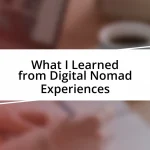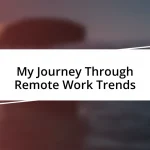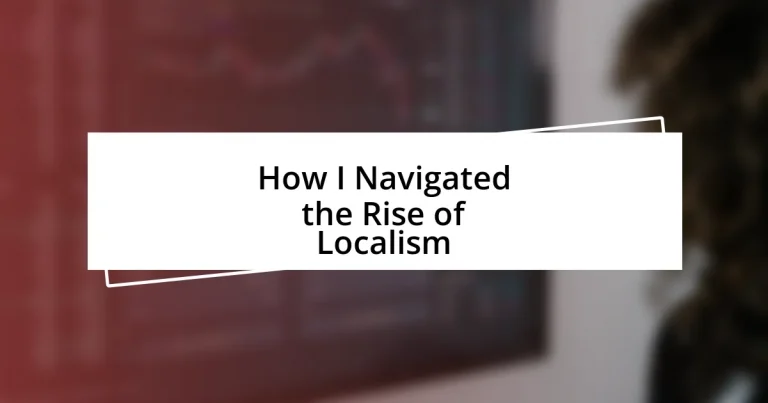Key takeaways:
- Localism emphasizes supporting local resources and communities, fostering connections that lead to economic and social benefits.
- Community engagement builds trust, creates networks of support, and enhances civic participation through shared activities and events.
- Supporting local businesses through shopping local and promoting them on social media continues to strengthen community bonds and boost local economies.
- Sustaining localism involves fostering connections, engaging with local leaders, and creating traditions that ensure long-term commitment and inclusion.
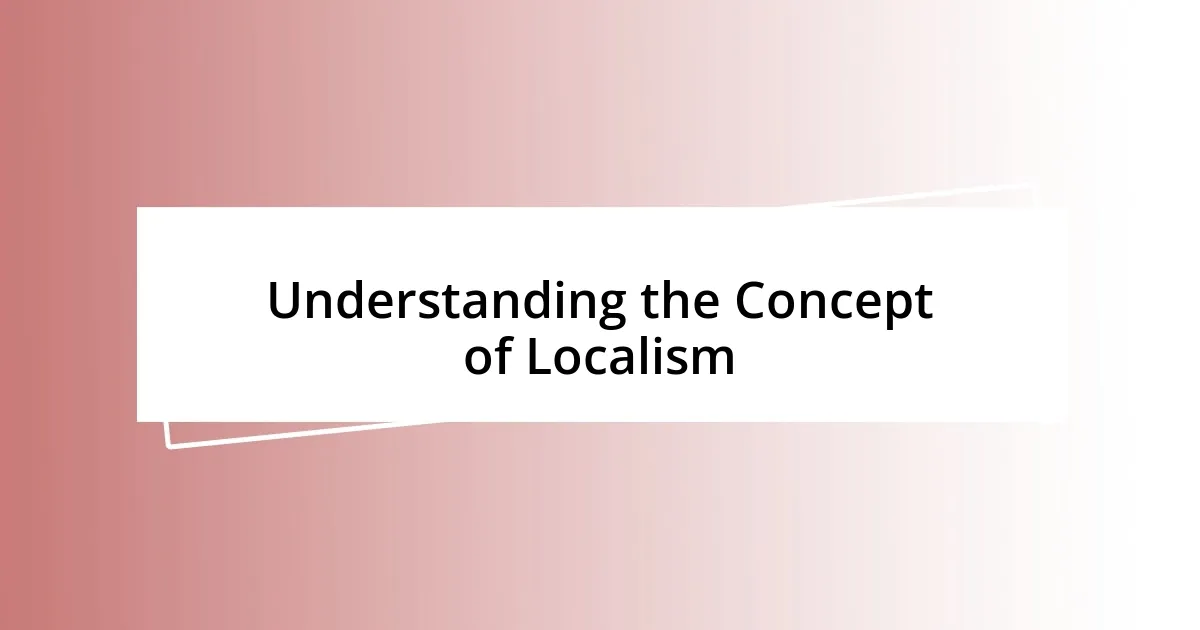
Understanding the Concept of Localism
Localism, at its core, is about prioritizing local resources, economies, and communities over larger, often distant entities. I remember attending a local farmers’ market one Saturday, feeling the energy of neighbors chatting and exchanging stories while supporting each other’s businesses. It made me wonder: how often do we overlook the power we hold right in our own backyards?
What strikes me most about localism is its emphasis on connection. I’ve seen how a small community can rally around a local coffee shop, turning it from just a place to grab caffeine into a hub for social interaction. Isn’t it fascinating how a simple cup of coffee can foster relationships and strengthen community bonds while contributing to the local economy?
Delving deeper into localism, I’ve observed that it’s not just an economic approach but a philosophy of living. For instance, when I started volunteering at a community garden, I realized that cultivating local food not only benefits my health but also enhances my relationship with the land and my neighbors. Isn’t it incredible how small, intentional choices can ripple through our lives in such meaningful ways?
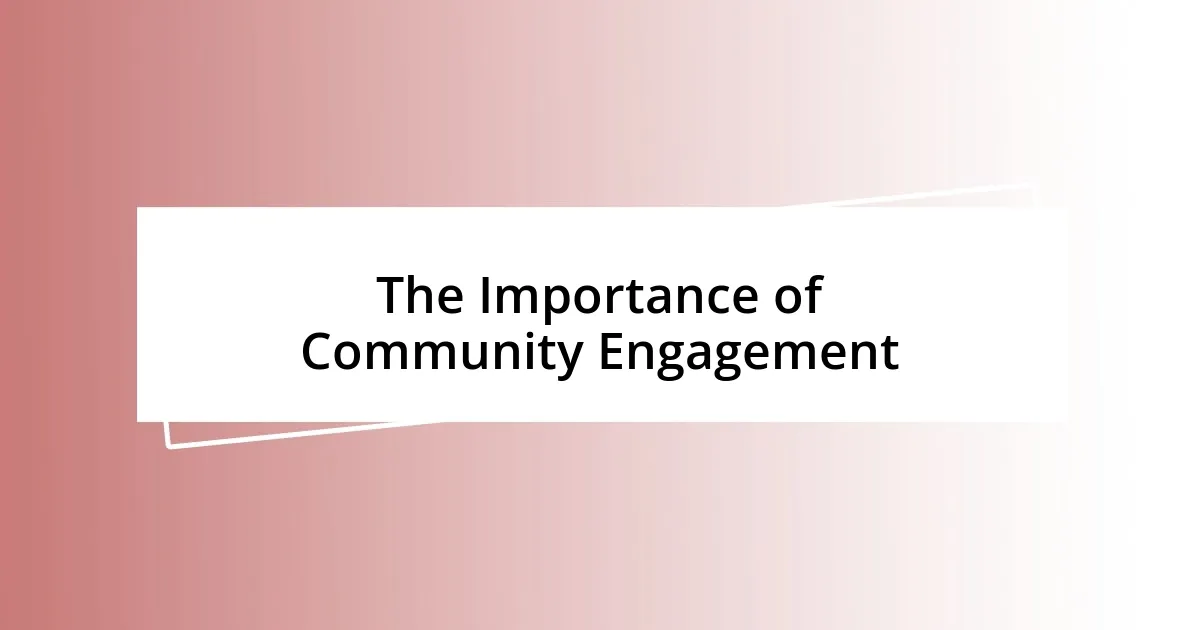
The Importance of Community Engagement
The power of community engagement cannot be overstated. I recall a time when I joined a local cleanup initiative; the shared purpose was invigorating. As we picked up litter, laughter and stories flowed, strengthening not only our relationships but also our commitment to our neighborhood’s well-being. It struck me how these small acts of participation can ignite a sense of belonging and ownership among residents.
- Community engagement fosters trust and understanding.
- It creates networks of support, essential during tough times.
- Local events can spark creativity and collaboration.
- Involvement helps individuals discover shared values, cultivating a sense of identity.
- Engaged communities often see increased civic participation, enhancing democratic processes.
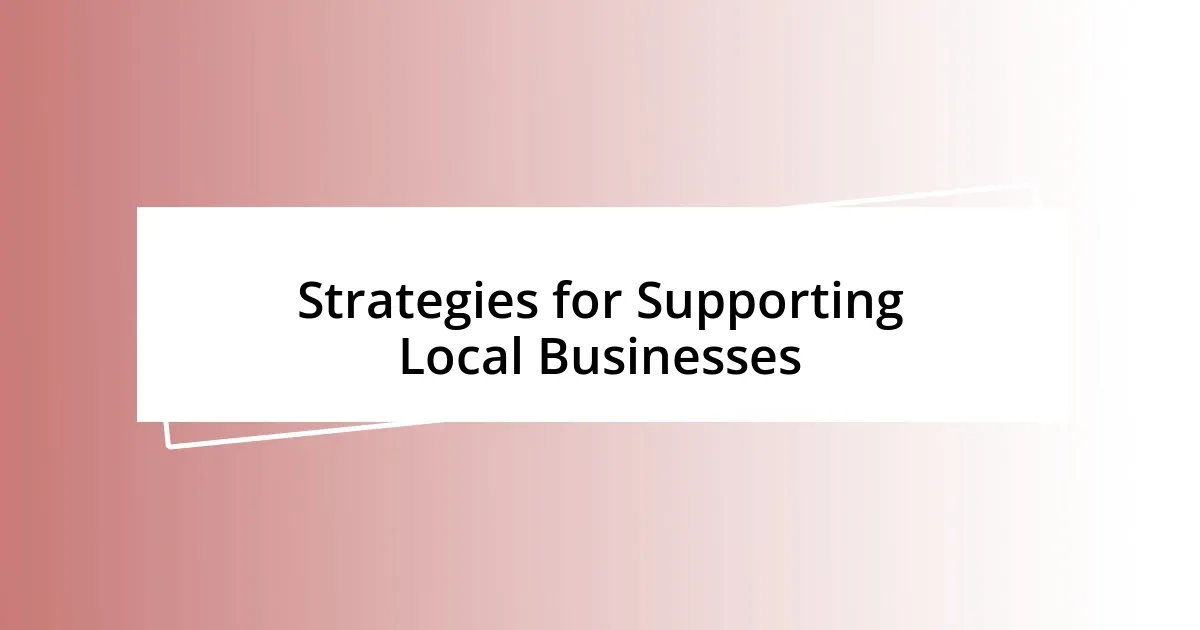
Strategies for Supporting Local Businesses
Supporting local businesses can take various forms, and I’ve found that one effective strategy is simply to shop local whenever possible. For instance, when I made a commitment to buy my groceries from a nearby farmer’s market instead of a large supermarket chain, I noticed not only the freshness of the produce but also the connections I developed with the vendors. It’s rewarding to know where my food comes from and the people behind it—they often share stories about their farms, which adds an enriching layer to each purchase.
Another strategy revolves around social media. I’ve seen how much impact a shout-out on platforms like Instagram or Facebook can have for small shops. One time, I posted a picture of a lovely handmade candle that I bought from a local artisan, tagging the shop in my post. The owner, whom I had met at an art fair, reached out to thank me and shared my post with her followers. It not only boosted her visibility but also made me feel good about supporting her business. Isn’t it amazing how a simple post can create ripples of support in the community?
Additionally, I’ve come to appreciate the value of local events. Attending craft fairs or food festivals allows me to connect with small business owners directly. I remember visiting a winter market where I discovered a local brewery. The owner was so passionate about his craft that it made my purchasing decision easy. By engaging in such events, I not only uplift local creators, but I also get a chance to understand their stories and passions—making my support feel truly meaningful.
| Strategy | Description |
|---|---|
| Shop Local | Prioritize purchasing from local stores and markets to foster community connections. |
| Leverage Social Media | Promote local businesses through personal posts, increasing their visibility. |
| Participate in Local Events | Engage with community markets or festivals to meet business owners and support their ventures. |
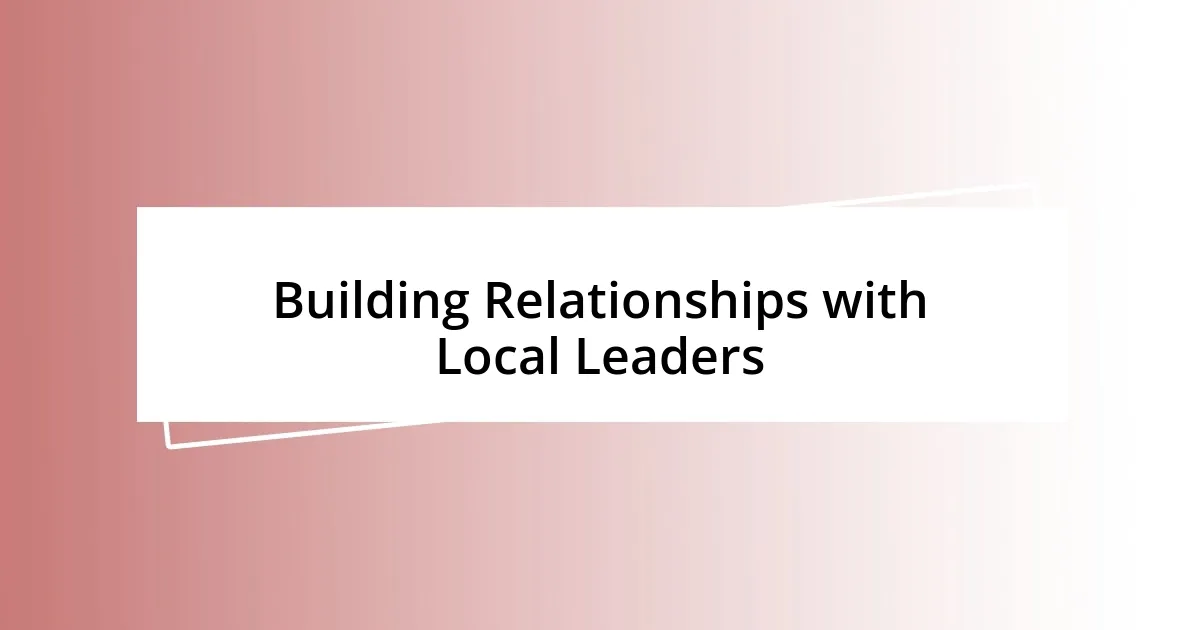
Building Relationships with Local Leaders
Building relationships with local leaders has been a game-changer in my journey through localism. I vividly recall attending a town hall meeting where the mayor spoke candidly about community concerns. After the session, I introduced myself and shared my passion for revitalizing local parks. That simple conversation ignited a collaboration I never expected; we began brainstorming together on ideas that could enhance our neighborhoods.
It’s fascinating how these relationships can grow. I once volunteered to help organize a local event with a city council member. As we worked side by side, I learned so much about their challenges and aspirations. We bonded over shared frustrations and dreams for our community, which not only fostered mutual respect but also opened doors to future projects. Isn’t it incredible how building genuine connections can turn local leaders into allies?
Trust is a crucial ingredient in these relationships. I remember hosting a community barbecue where I invited nearby officials to join us. It was heartwarming to see them mingle with residents, swapping stories and laughter. These informal settings break down barriers and create a space for open dialogue. As I watched my neighbors connect with our leaders, I realized that relationships built on trust and communication can significantly enhance community efforts. What could be more empowering than knowing that your voice is heard and valued?
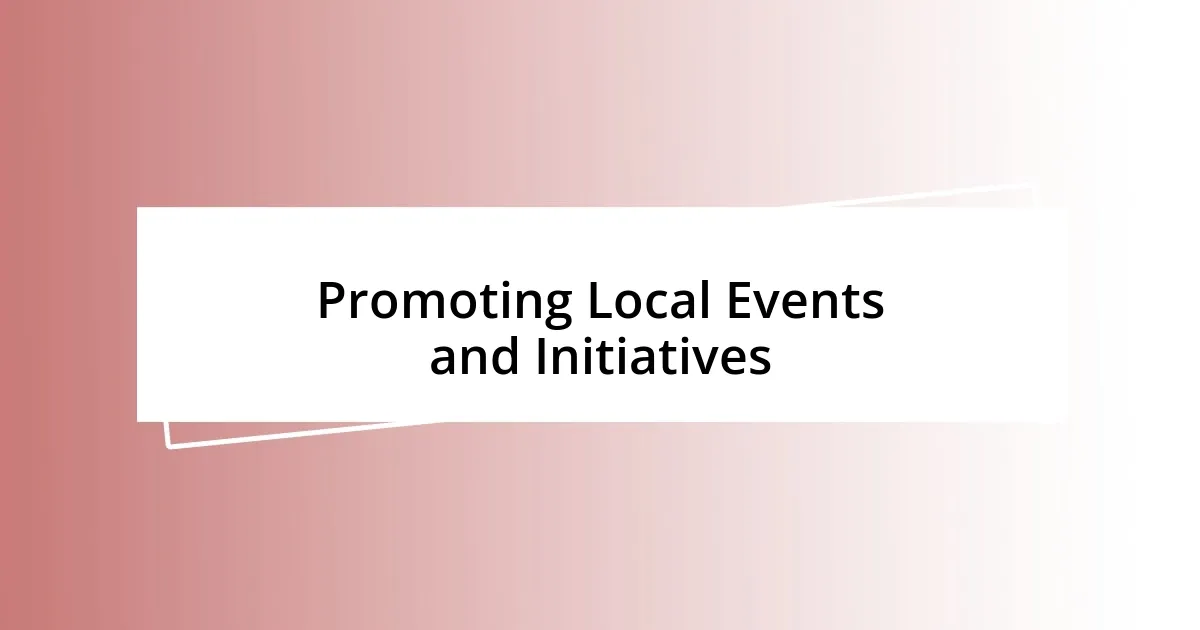
Promoting Local Events and Initiatives
Promoting local events is like planting seeds of community connection. I remember helping to organize a street fair for local artists and craftspeople. The day of the event, the energy was electric; families strolled together, laughter filled the air, and I felt the pride in showcasing the talent our town had to offer. I found it truly moving to supervise a gathering that not only supported local creators but also nurtured the bonds among our residents.
Publicizing these initiatives can also create visible impact. One strategy I’ve used is to collaborate with local schools for awareness campaigns. When I joined forces with a nearby high school to promote a charity run, the excitement spread like wildfire. Students designed posters and shared on social media, and before we knew it, the event had attracted participants from outside the school. Witnessing the collective effort made me realize how powerful our local youth can be when given the chance to shine.
It’s interesting to see how small changes can lead to bigger outcomes. I often volunteer at my community’s monthly farmers’ market, where I noticed encouraging motives from the vendors. They started creating themed days, like “Local Brew Sundays,” which brought in not just regulars, but newcomers eager to discover what our area has to offer. I can’t help but ask, how can we harness such enthusiasm to keep building connections and celebrating our local gems? Each event has the potential to weave a stronger fabric of community where everyone plays a part.
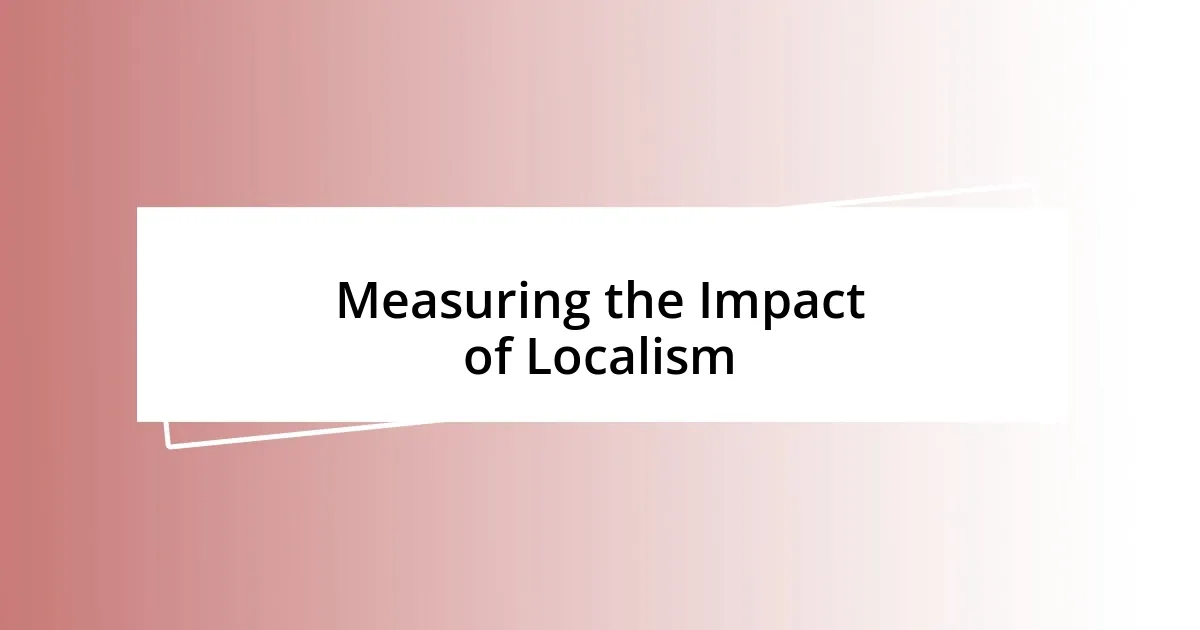
Measuring the Impact of Localism
Measuring the impact of localism can initially feel like an abstract concept, but I’ve found that looking at specific outcomes helps bring clarity. For instance, after we implemented a local recycling initiative, I noticed an incredible shift in community engagement. Just a few months later, residents were sharing their own tips and ideas on social media, which sparked a busier dialogue about sustainable practices in our town—how exciting is it to see that kind of ripple effect?
Another way I gauge localism’s impact is through economic revitalization. When I initiated a “shop local” campaign, the response was overwhelming; local businesses reported a notable increase in foot traffic. I’ll never forget the joyous energy of a small bookstore bustling with customers eager to support their neighborhood. Witnessing a community unite and uplift one another made me ponder: can our spending habits truly shape the future of our town?
Lastly, I’ve learned to value the emotional connection residents feel through localism. At a recent community gathering, I encountered a long-time neighbor who thanked me personally for organizing events that made her feel included. That moment underscored something profound: localism isn’t just about initiatives and statistics; it’s about fostering a sense of belonging. How can we measure success in our communities without acknowledging the heart behind it?
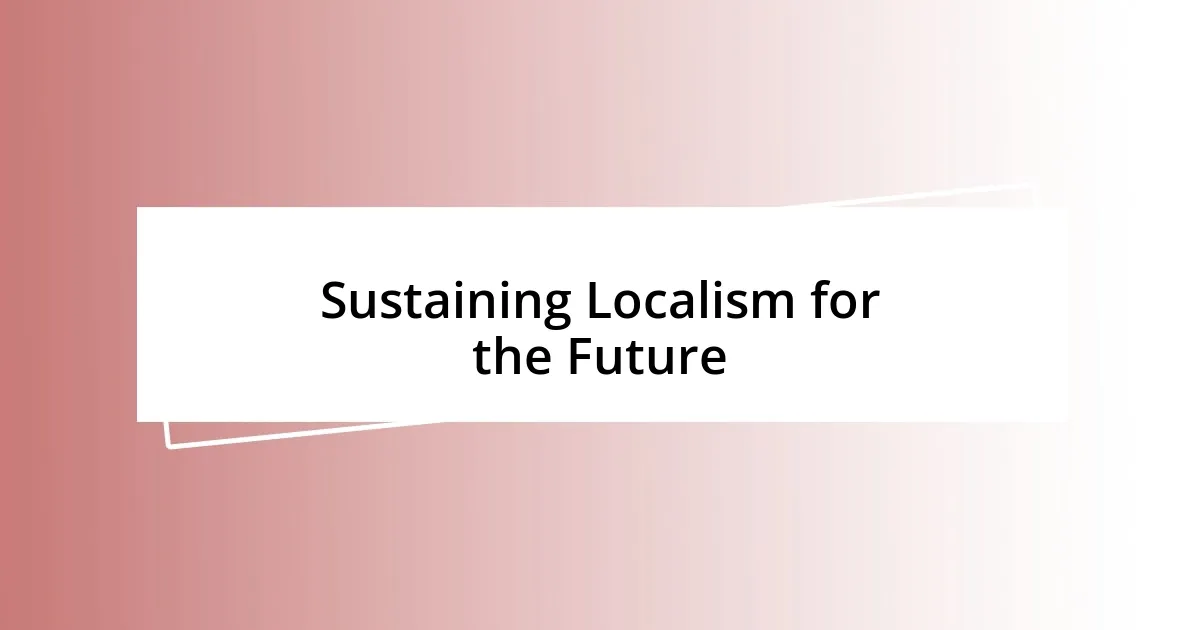
Sustaining Localism for the Future
Sustaining localism for the future involves nurturing the very connections that bring us together. I recall a weekend when I organized a storytelling night at a local café. The room filled with voices sharing personal narratives; it became clear that everyone had a unique story tied to our town. Seeing that enthusiasm sparked a realization: how can we continue creating spaces where these voices resonate, helping to solidify our collective identity?
One often-overlooked element is the engagement of local leaders in these conversations. I remember attending a forum where local officials and residents openly discussed development plans. The dialogue transformed into a brainstorm of innovative solutions, highlighting the power of participatory governance. I can’t help but wonder—how can ongoing collaboration with our leaders solidify a commitment to localism that resonates through generations?
Moreover, the creation of community traditions can be a robust foundation for sustainability. During an impromptu potluck picnic in a park, I saw families share dishes reflecting their diverse backgrounds. This moment reminded me of the importance of celebrating our heritage. Could we envision a future where these traditions evolve into annual events that not only honor where we come from but also encourage newcomers to join in? By crafting shared experiences like these, we foster a sense of belonging that makes localism thrive.

